
eCommerce Market Research: The Ultimate Guide for Beginners
eCommerce is booming. New sellers jump in every day with big dreams and bigger expectations. But here’s the harsh truth. Most of them skip the one step that keeps a store alive: real market research. They follow trends, copy what others are doing, and hope luck will cover the gaps. It rarely does.
If you want to build something meaningful, you need a product people actually want and a niche where you can stand out. Look at examples like Little Kids Business or JOSHi. They didn’t chase hype. They picked smart niches with real demand.
That’s what this guide helps you do. If you’re planning to launch an online store, consider this your starting point.
The Rise of eCommerce
eCommerce isn’t “the next big thing” anymore. It’s already where shoppers spend their money. Even retail giants like Walmart had to shift online because customers expect convenience, fast delivery, and quick comparisons.
The numbers prove this shift. Statista reports that global retail eCommerce sales almost tripled between 2014 and 2023. That growth didn’t happen in one region. Emarketer’s data shows steady increases across North America, Asia, Europe, and emerging markets.
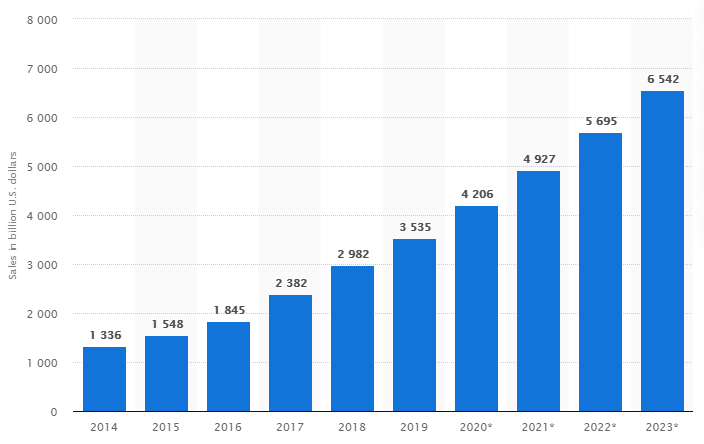
This rise inspires many new entrepreneurs to jump in fast. But that excitement often pushes them to launch stores without checking whether their product has demand. That’s exactly where market research saves you. It helps you understand what people want, what they ignore, and where you still have room to grow.
The fact that the eCommerce sales figure has increased by almost 3 fold in just a matter of 6 years is not a surprise. It has been steadily increasing not just in the USA, but all over the world.
Here's a stat from eMarketer, demonstrating the region-wise eCommerce growth, and you can see the number is going upward everywhere around the globe.
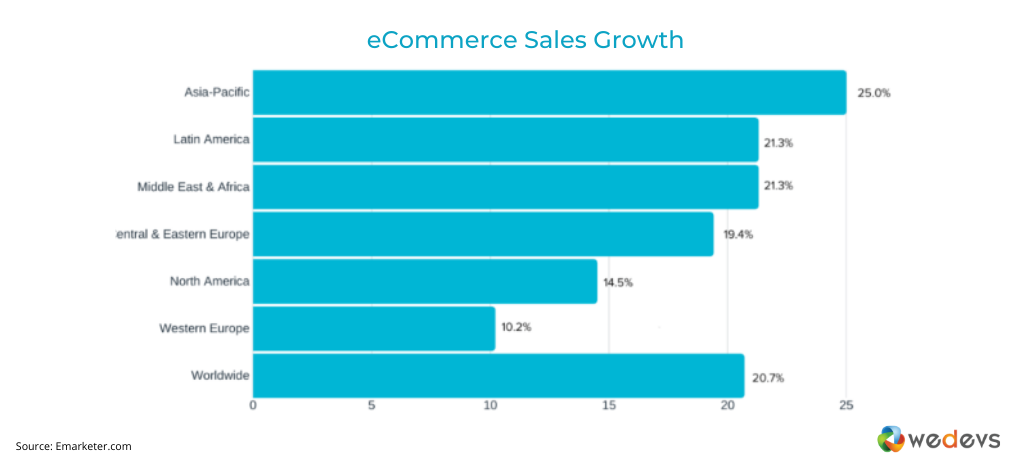
These figures are both inspiring and tempting. So people often want to start an eCommerce website and start earning a big sum without analyzing the market and the product they want to sell. That is where the eCommerce Market Research comes in to save.
What is eCommerce Market Research?
eCommerce market research helps you understand what people want to buy online. It’s the process of collecting data about customer needs, product demand, and overall buying behavior. Oxford defines market research as gathering information about consumers’ needs and preferences, and that idea fits eCommerce perfectly.
When you research your market, you see which products are growing, which ones are fading, and where new opportunities are opening. Instead of relying on gut feelings or hype, you make decisions backed by real data. That gives you a better chance of launching a product people actually want.
How Does Market Research Help to Grow and Win
Market Research was not a big thing for eCommerce even a couple of years ago. Nowadays it is becoming essential. If there is anything we can all agree upon, that is –
Data may disappoint, but it never lies.
– Jay Samit
With market research, you can get real data that can help you decide the market demand for a product. This way you don't need to rely on your intuition or the buzz.
The advantage of not following the buzz all around you is that you get to know what exactly your customers need.
For example, let's say you want to create an eCommerce marketplace and sell Wooden Ornaments as you saw some of the people around you wearing those. But you don't even know if the Wooden Ornaments are popular all around your country.
Now, if you do a quick research on Wooden Ornaments on Google Trends, you'll find something like the below image.
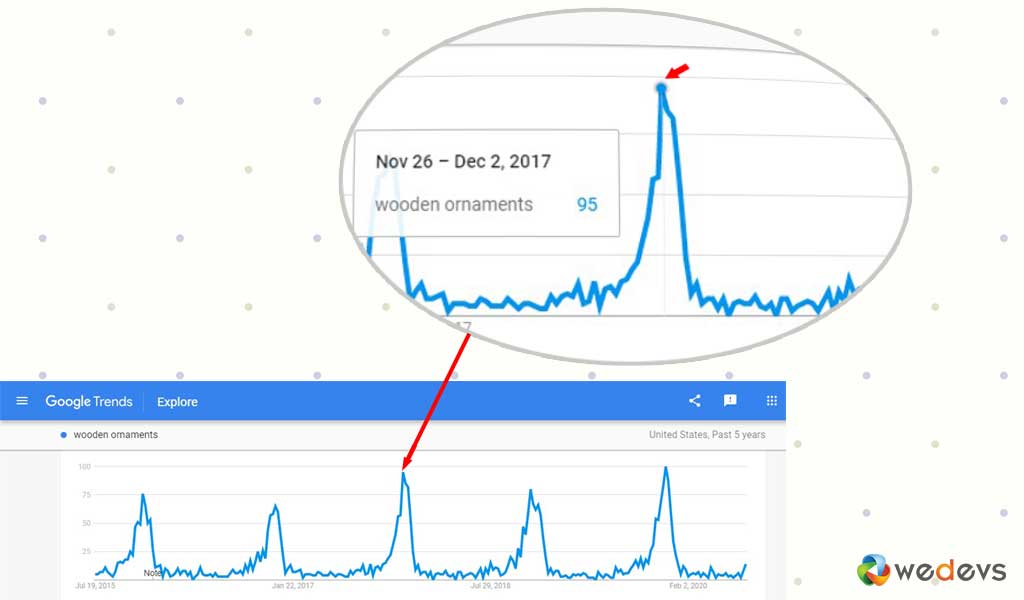
You can see clearly from the data that Wooden Ornaments are most popular during November and December every year. Now you know that selling Wooden Ornaments throughout the year is not a good idea.
This is how market research can help you determine the demand and potential of a product. Albeit this is just a small part of what we will be going through in this blog. But you got the idea, right?
Choosing the right product to sell at the right time and finding a product whose market is still not saturated with too many providers is the key to being successful for a new eCommerce, and that's what you can find out with market research.
Fundamentals of eCommerce Market Research
Market research is a part of your overall marketing strategy. To know market research from its core, you have to know its fundamentals or basics. Market research can be divided into four primary categories. Which are –
- Exploratory market research
- Descriptive market research
- Casual market research
- Predictive market research
Now don't get worried, we're going to explain all the types of market research in detail.
I) Exploratory Market Research
Exploratory market research is the preliminary stage of your research. At this stage, you haven't yet decided on a product. In this stage, you will try to find products that you can sell.
Make a list of all the potential products that you can find through several methods, such as Google Search, Google, Trends, Amazon, and even your nearest supermarket.
Next up, formulate a strategy by which you can eliminate all the ideas that are impractical, does not match your available resources and skill set. Now only those are left that you think you're interested and possible with your resource. That gets us in the next step, which is descriptive market research.
II) Descriptive Market Research
Descriptive market research looks deeper into your selected products and helps you finalize the ultimate niche. In this phase, you will have to find answers to questions like –
- Who are the potential buyers of the product?
- What is the demand for the product?
- When does the demand hit its peak?
- Who are the potential competitors?
- What are their specialties?
These questions can help you find your long-sought answer, the perfect product to sell, when, and to whom.
III) Casual Market Research
Casual market research is the next step of descriptive market research. It basically deals with the aftermath of one decision to another. For example, let's say you decided to sell Wooden Ornaments. Most of the competitor sells Wooden Ornaments made of ‘X' trees. But you think ‘Y' tree would be more cost-saving.
So, if you go with the ‘Y' tree, what impact it would have on product quality? Or, you decided to use a new type of color on the ornaments, what would be the effect of that? These are the things casual market research helps you find.
After you choose your product finding a cost-saving way of production becomes a big challenge and casual market research is necessary for that.
IV) Predictive Market Research
As the name suggests, predictive market research is about predicting or forecasting the future growth opportunity of a product. But prediction these days is not all about your gut or intuition, we depend more on data gathered from sources like Google trends, and statistics than our sixth sense.
Predicting the growth of a product perfectly can essentially help you make a better decision on a product.
AI-Driven Market Research in 2026: What New Sellers Can’t Ignore
The market in 2026 is very different from even two years ago. AI tools now do the heavy lifting that used to take hours. You can discover trends, analyze competitors, predict demand, and test product ideas faster than ever. If you use these tools well, you get an edge that old-school research can’t give.
1. Smarter Trend Discovery
AI tools collect signals from search engines, social platforms, shopping behavior, and product reviews. They spot shifts before they go mainstream. Instead of guessing which niche is rising, you get early alerts that help you move first.
2. Instant Competitor Mapping
You no longer need spreadsheets or manual audits. AI looks at pricing, product updates, ad strategies, and content performance in minutes. You see what competitors prioritize and where their weaknesses are.
3. Real-Time Customer Insights
AI reads thousands of reviews, comments, and social posts. It highlights what customers love, what they hate, and what gaps still exist. You can shape your product around real frustrations instead of assumptions.
4. Demand Forecasting With Better Accuracy
Old forecasting relied on past sales. Modern AI blends search trends, seasonal behavior, economic shifts, and even social buzz. You get demand predictions that are far more accurate and easier to trust.
5. Product Validation Without Guesswork
You can test ideas before you spend money. AI simulates customer reactions, landing page demand, ad performance, or even buying intent. You learn quickly which ideas deserve investment and which ones don’t.
6. Personalized Research for Your Store
Some platforms now build market research around your niche, audience, and product type. Instead of general advice, you get tailored insights that match your exact goals.
7. Faster Decision-Making for New Entrepreneurs
The biggest benefit is speed. Tasks that once took days now take minutes. This helps new entrepreneurs make bold but smart decisions without wasting time or budget.
How to Conduct an eCommerce Market Research: A Step-by-Step Guide for Beginners

We have all the basics of how market research works, and now is the best time to get to know how to conduct one. Now, there are four different parts of eCommerce market research, which are –
- Discovering Products
- Understanding Consumer
- Analyzing Industry
- Analyzing Competitors
In the next few paragraphs, we will show you how to perform the four different parts of market research for eCommerce. Without further ado, let's get started!
Step 01: How to Discover Products
Discovering products is the first and foremost thing to do while you're performing market research. You can try out several methods to find and seek the values of a product. Some of the most popular tools to do that are Amazon's Most Wished-For List, Keyword Research, Google Trends, SERPs, and Social Media.
a) Amazon Most Wished-For List

Amazon's most-wished-for list is extremely useful when it comes to finding products that have high demand. You can choose different categories after visiting this page of Amazon Most Wished For List. You will have all sorts of products to choose from and get the perfect products for you to sell.
b) Keyword Research
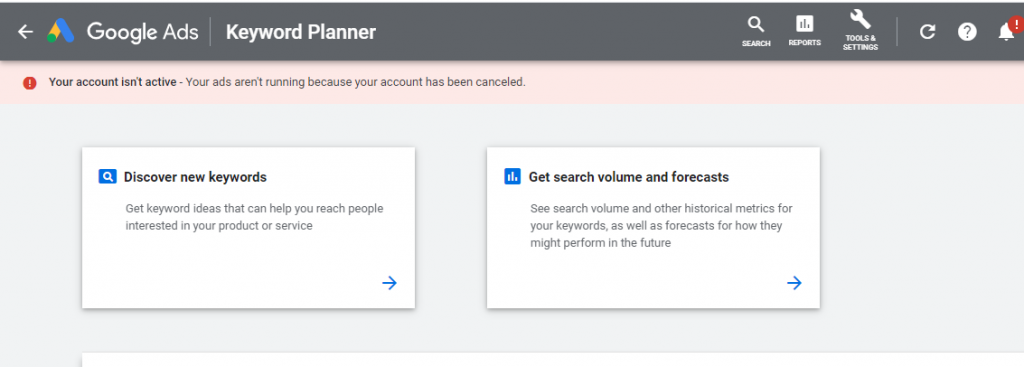
Keyword Research is a broad field and we will not get into the cores of it. But to find products that have good demand, keyword research can come in very handy. There are many tools to help you do keyword research, but we will only talk about Google Keyword Planner.
It works like this, you either enter the name of the product to discover related keywords that people search a lot about, or you can get search volume and probable search forecast for a certain product. If you already have a list of products and you're now scrutinizing your options, keyword research, especially Google Keyword Planner, can help you do that.
c) Google Trends
Google Trends is a great way to find new products and check whether the interest of people increased or decreased in the last few years or so. The way it works is fairly simple. Visit Google Trends, and search for any product it'll show you something like the image below.
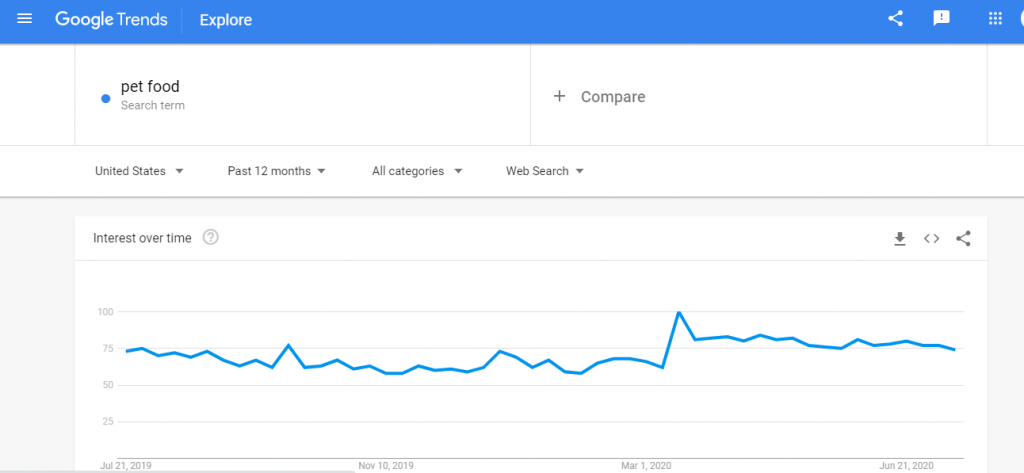
You can easily determine from the result whether the interest has increased or decreased over time for that specific search term. You can also filter your results with your preferred country.
If you are not yet sure of a product you can use another smart feature from Google Trend.

The above page will be shown when you visit Google Trends. You can see there are three options down below that can help you know top interests worldwide and country-wise. From here, you can easily find some products that you can sell.
d) SERPs
SERPs or Search Engine Result Page can also be a great option for discovering products. In the image below, you can see that we searched on Google with the term “products for car” and scrolled to the bottom of the page, and as you can see it is showing search terms like best car cleaning products, best car wash products, best car detailing products.
Got an idea of how it can help?

e) Social Media
The main purpose of Social media is not to do market research but to connect people. Yet, there are no better places to know people's interests, psychology, and everything that has to do with market research.
Facebook groups, in particular, can be very useful to know the interest of people in a product. You can also try researching the most popular hashtags. You will be amazed at how much data you can get from social media for your market research.
Step 02: How to Understand Consumers' Needs & Wants
As of now, you already decided which product you want to sell, right? Now it's time to know the people who are going to buy your products. There are several ways you can try to understand your customer base. Some of the most effective ones are –
- Survey
- Consumer Report
- Facebook Audience Insight
Now let's discuss each of the above points!
a) Survey

The consumer survey is one of the most common practices of knowing your customer better. There are many online platforms like Google survey, to do surveys. Apart from that, you can also conduct surveys on big Facebook groups that share the same interests with permission from group owners.
b) Consumer Report
Sales reports can bring out some very key information for market research, such as;
- Does free delivery influence purchase decisions?
- Is Instagram more important than Facebook to run your ads?
- Which platform saw the highest conversion rate?
These are the things that you'll get to know from consumer reports. You can find many of them just by searching on Google.
c) Facebook Audience Insight
This is one of our favorite ways to gather customer insight. Facebook audience insight can provide data like your potential audience's demographic overview, other interests, and even their lifestyles.
Step 03: How to Analyse Industry
Analyzing an industry is a crucial step in conducting eCommerce market research. To begin, it's important to gather data on the size and scope of the industry, including market trends, key players, and potential growth opportunities.
This can be done through market reports, industry publications, and government data. Next, it's essential to analyze the competitive landscape, including the strengths and weaknesses of existing businesses and potential barriers to entry.
Additionally, understanding consumer behavior and preferences within the industry is vital for developing a successful eCommerce strategy. This can involve conducting surveys, studying customer reviews, and analyzing social media trends.
Finally, it's crucial to stay updated on industry news and developments to ensure that your eCommerce business remains competitive and relevant.
Step 04: How to Analyse Competitors
There is no business without competition. To step up your growth, you have to keep a close eye on your competitors and what they are doing. Luckily, we have a complete guide on competitor analysis. You can check that blog for an in-depth review.
In short, competitor analysis is about knowing your competitors. Understanding your competitor analysis can help you make your business strategy more easily. Thus, you can choose how to market a product in a better way than your competitor.
Step 05: Use AI Tools to Speed Up Your Research
AI changed how market research works in 2026. You don’t have to check dozens of websites or dig through endless data anymore. AI tools pull information from search trends, customer reviews, product listings, ad libraries, and social media. Then they turn all that data into simple insights you can use right away.
Here’s what AI can help you do:
a) Discover Rising Products Before Competitors Notice
AI tools scan search volume spikes, social buzz, and new buying patterns. They warn you when a product category starts gaining momentum, even before it appears in traditional trend tools.
b) Analyze Competitors in Seconds
You get a quick breakdown of pricing, product features, customer complaints, ad angles, SEO keywords, and content performance. This saves you hours and gives you a clear direction.
c) Understand Customer Sentiment
AI reads thousands of reviews and comments. It highlights what customers love, what frustrates them, and what opportunities exist. You can improve your product before you even launch it.
d) Forecast Demand With Better Accuracy
Modern AI blends search data, seasonal behavior, purchase intent, and even economic shifts. You get a reliable prediction of whether a product will grow or fade.
e) Validate Product Ideas Instantly
Some AI platforms let you test product photos, descriptions, names, and even ad angles. You see early signals about engagement or buying intent without spending money on ads.
This step helps you make decisions faster and avoid costly mistakes. It’s now one of the most important shortcuts for new eCommerce sellers.
AI Tools You Can Use for eCommerce Market Research
| AI Tool | What It Helps You Do |
|---|---|
| Google Gemini Insights | Spots rising trends, product interest spikes, and early demand signals. |
| ChatGPT Product Analyzer | Summarizes reviews, compares competitors, and highlights market gaps. |
| Jungle Scout AI | Finds winning Amazon products and predicts demand strength. |
| Semrush AI Keyword Finder | Checks search volume trends and validates product demand. |
| Ahrefs AI Competitor Scanner | Analyzes competitor websites, top pages, and weaknesses. |
| Glimpse AI | Detects micro-trends across TikTok, Instagram, Reddit, and YouTube. |
| Perplexity | Fetches fresh data from reports, pricing pages, and online discussions. |
| Helium 10 AI Assistant | Helps Amazon sellers forecast demand and avoid saturated niches. |
| Notion Research AI | Organizes and summarizes all your research into simple reports. |
| Frase AI | Analyzes top-ranking content and reveals topic or niche gaps. |
Finalize Your Market Research Outcomes
Every operation has a result. Market research is no different. In fact, proper market research creates a good foundation for a long-standing business.
After completing market research, you will get to know the following things and get your business started.
- The right product to kick-start your eCommerce business.
- Best time to sell your product.
- Insights into your potential customers such as their age group, location, and interests.
- Information about your competitors to give you an edge over them.
Experts' Suggestions for a Successful eCommerce Business
Every successful eCommerce has two things in common: proper strategy and hard work. But some extra tips from experts can enhance the chance of making it successful.
We have years of experience helping people make successful marketplaces using Dokan. Very few can help you with effective suggestions than us, so let's get to it.

i) Think How a Customer Would Think
Whether you are still deciding on a product or you are convinced of one, there is one thing you must keep on doing. Think like a customer. Ultimately, it's not about what you like, but what people like. So be sure to choose a product that most people prefer. Otherwise, nothing can stop a pile of never-ending inventory.
ii) Try, Try, and Try
No matter how much you read, you can't possibly know everything before you experience them. Whether you are a new entrepreneur or, launching a new product, experimenting with different things is a must.
If something doesn't work, move on to the next plan. An advertisement doesn't work, move on to a new one. A strategy failed miserably, form a new one. This is the only way you can eventually see the lights of success.
eCommerce Market Research- Final Words
Market research has been the norm for large companies for a long time. But day by day, it is becoming essential for newer eCommerce businesses as well. Great market research will not create immediate value, but you'll start to experience benefits as your business grows.
Often, eCommerce owners select a trendy product that ultimately results in devastating failure. These things can easily be stopped by performing market research.
If you are also an eCommerce owner, there's a good chance you have heard of a multivendor marketplace. Given the popularity of Amazon, eBay, Etsy, and Aliexpress, it would be no wonder if you'd like to build one yourself.


